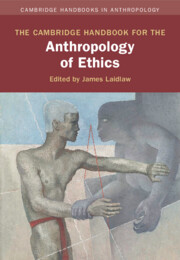Book contents
- The Cambridge Handbook for the Anthropology of Ethics
- Cambridge Handbooks in Anthropology
- The Cambridge Handbook for the Anthropology of Ethics
- Copyright page
- Contents
- Contributors
- 1 Introduction
- Part I Intellectual Sources and Disciplinary Engagements
- Part II Aspects of Ethical Agency
- Part III Media and Modes of Ethical Practice
- 16 Self-Cultivation
- 17 Exemplars
- 18 Ritual
- 19 Values
- 20 Rules
- 21 On Ethical Pedagogies
- Part IV Intimate and Everyday Life
- Part V Institutional Life
- Index
- References
19 - Values
from Part III - Media and Modes of Ethical Practice
Published online by Cambridge University Press: 11 May 2023
- The Cambridge Handbook for the Anthropology of Ethics
- Cambridge Handbooks in Anthropology
- The Cambridge Handbook for the Anthropology of Ethics
- Copyright page
- Contents
- Contributors
- 1 Introduction
- Part I Intellectual Sources and Disciplinary Engagements
- Part II Aspects of Ethical Agency
- Part III Media and Modes of Ethical Practice
- 16 Self-Cultivation
- 17 Exemplars
- 18 Ritual
- 19 Values
- 20 Rules
- 21 On Ethical Pedagogies
- Part IV Intimate and Everyday Life
- Part V Institutional Life
- Index
- References
Summary
Anthropologists of ethics have often drawn inspiration from ancient virtue ethics and ordinary language philosophy. What might be gained for the study of ethics by drawing on a theory of values? This chapter shows that value theory, in allowing us to distinguish between moral and non-moral values, offers two ways of conceptualizing ethics. Narrowly conceived, ethics is about people’s efforts to realize moral values, hence to relate to other people in the right way. Broadly conceived, ethics is also about people’s efforts to relate in appropriate ways to the variety of values they recognize, including aesthetic and epistemic ones. Employed on their own or in combination, the narrow and the broad conceptions are uniquely suited for a systematic comparison of ethical life across a diverse range of societies. A comparative discussion of cases from Africa and Euro-America shows that while the content and relative weight given to moral values vary significantly, valuing things appropriately is always an ethical matter.
- Type
- Chapter
- Information
- The Cambridge Handbook for the Anthropology of Ethics , pp. 485 - 507Publisher: Cambridge University PressPrint publication year: 2023



